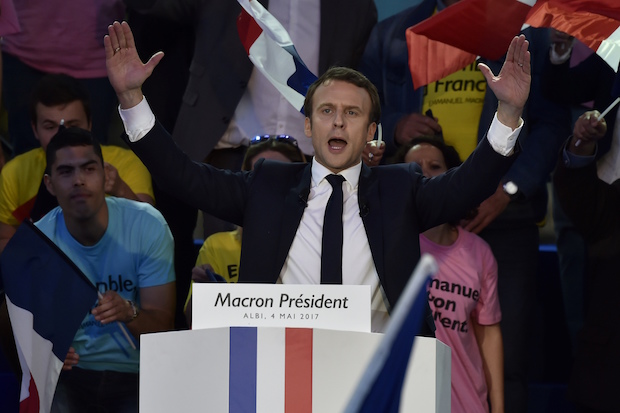Sunday night’s extravagant celebration of Emmanuel Macron’s ascension to the presidency of the fifth republic will draw le tout Paris but not everyone will be celebrating. The 2017 presidential campaign has left very few voters outside the Parisian bubble satisfied. While the bien pensants celebrate, millions of voters have been left in a sour mood, neither convinced that the country will now be piloted in a better direction, or even that the election itself was wholly legitimate. The result, while not quite North Korean, does leave an uncomfortable aftertaste.
The headline numbers look great for Macron who will cruise to victory with more than 60 per cent of the vote, compared to under 40 per cent for Marine Le Pen. But Macron represents everything most French voters do not like: globalisation, banking, Bilderberg, the EU. He has been elected not because of what he believes, but because he is not Marine Le Pen.

This has been a campaign shrouded in enigma. It began with the elimination of the Republican François Fillon, the only credible alternative to Macron, brutally assassinated by the media and the magistrates (who are nakedly political in France, one reason few London banks will ever move here).
Very little about Macron’s purported stunning political insurgency rings true. His campaign cost maybe €80m but who paid? And who will benefit? Perhaps Macron will reveal hidden depths of character and powers of persuasion, but so far there’s been little evidence that this is present.
Early in the campaign it seemed to me that Macron was entirely the creation of a group around President Hollande. Nothing that has subsequently unfurled has weakened this analysis. Nor has Hollande done much to disabuse anyone of the notion, since when all is said and done, he will go down in history as something of a master conspirator, who having blown his own chance of re-election, successfully installed his chosen successor.
The media in France suffers from groupthink and predictability and has shamelessly backed Macron, which some will consider reasonable, considering the alternative. Le Pen is a socialist nationalist with an incoherent economic policy and a toxic brand that she will never be able to shake off.
The performance of the media is nevertheless discreditable. Le Pen was never really given a chance to seriously discuss her policies. On television podiums she was subjected to constant attacks, drowning out all her attempts to be heard. Even if she may not have the most coherent program, what the journalists failed to credit was that millions of French people are attracted to her ideas and it might be wise to understand why.
The conflicts that confront Macron are intense and include the elections to the National Assembly in June for which he has so far selected just 14 candidates. Macron’s movement is hardly a political party. Even if Hollande’s master plan is that it should emerge as a ‘centrist’ successor to the Socialist Party, at the moment it has but one self-appointed leader, no structure of party democracy, and little local presence.
For Britain, Macron poses questions and potential problems. He believes that Britain must pay a €60 billion Brexit fee, emerged from visiting Theresa May to attack Brexit, and his prime interlocutor in Europe will be Muttie Angela Merkel (whose age is not un-adjacent to that of his wife, Brigitte, 25 years his senior).
If the last-minute Macron leaks dump tells us anything it is that the Macron campaign was ruthlessly disciplined and had, it appears, thought of everything. It also revealed the extensive censorship employed by the French government to prohibit details of the documents from becoming widely available. The timing on the eve of the pre-election quiet period was bizarre as it was hardly going to help Le Pen, especially as she was immediately blamed for it. The more conspiratorial believe the timing not accidental as it probably helped Macron. In any case, there seems to be no smoking gun. The issue-by-issue position papers were slick, well-considered and comprehensive. Perhaps there will be some embarrassing documents to be revealed as a detailed trawl of the cache gets underway, but the blindingly obvious is that Macron was supported by a large and expensive back office.
By the end of the week, the list of those who had declared themselves for the two candidates was ludicrously lopsided. The Macron peloton comprised Obama, Merkel, Jean-Claude Juncker, president François Hollande, former president Nicolas Sarkozy, pop-philosopher Bernard Henri-Levy, eco-activist José Bové, Mitterrand counsellor Jacques Attali, 1968 rebel turned euro MP Daniel Cohn-Bendit, the French communist party, all the big unions, all the newspapers, the entire chattering class and Medef, the French industry federation. Marine Le Pen, not so much, beyond Brigitte Bardot. I suspect this coalition will have fallen apart by tomorrow morning.
On my way to the Salle du Peuple this afternoon to help with the voting (I am a municipal councillor) I ran into half a dozen of my chums and we stopped to chat. Had they voted? For whom. Five had voted blanc – in effect, a blank ballot. These were not baba-cool lefties but serious guys with sensible and responsible jobs.
Macron is president but he starts out under a deep cloud of suspicion and doubt and while there may be a honeymoon, and plenty of Champagne quaffed at the Louvre, expect it to be very brief.
Jonathan Miller is the author of France a Nation on the Verge of a Nervous Breakdown and tweets @lefoudubaron







Comments